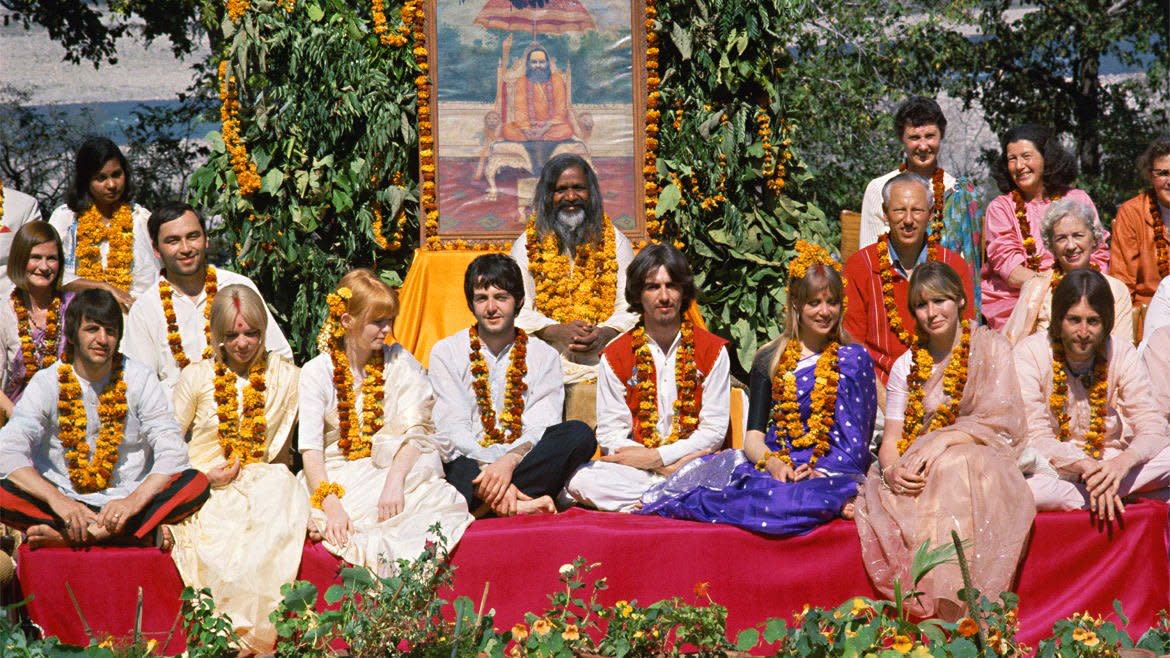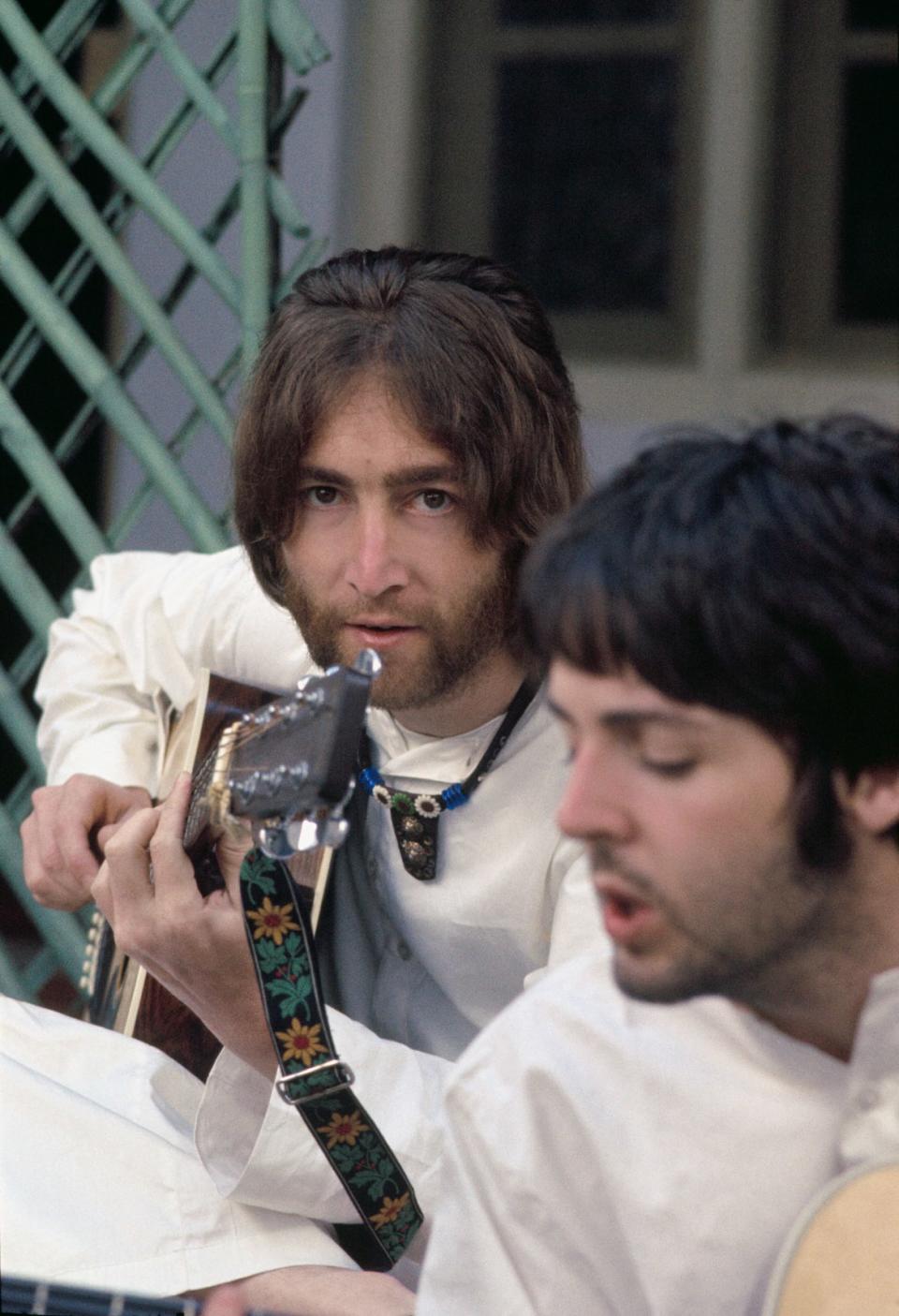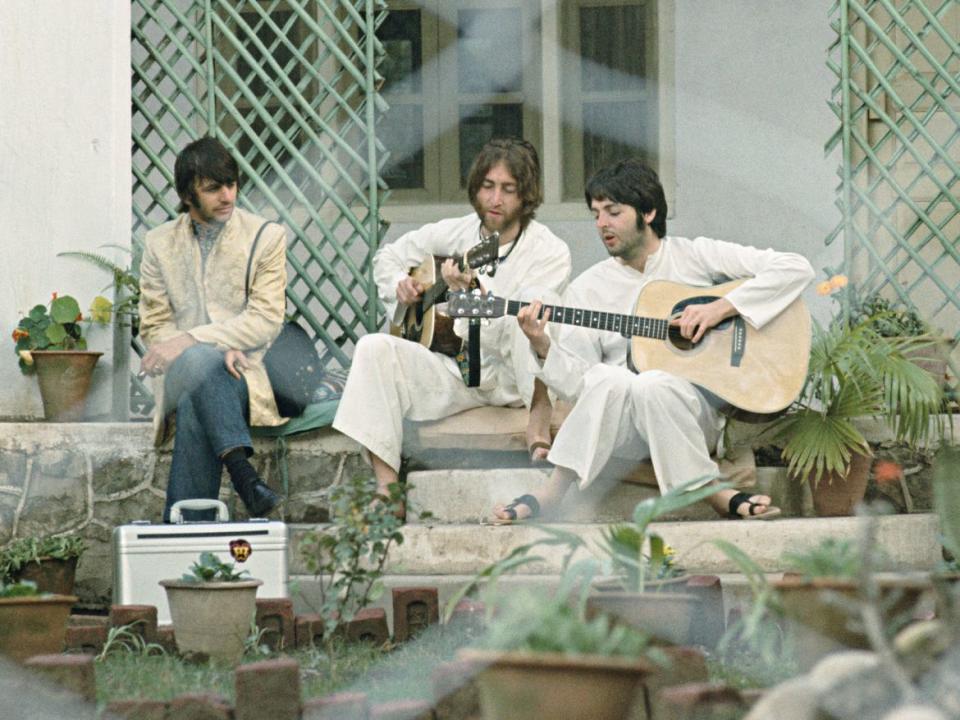My Transformative Time With the Beatles in India

“We were there four months—or George and I were. We lost thirteen pounds and (barely) looked a day older,” John Lennon told a BBC reporter while promoting the Beatles’ new business venture, Apple Records, of The Fab Four’s 1968 visit to India to study with Maharishi Mahesh Yogi. “I don’t know what level he’s on, but we had a nice holiday in India and came back rested-to-play businessmen.”
“He’s on the level,” Paul McCartney, ever the diplomat, chimed in.
Fifty-two years ago, in the spring of 1968, the Beatles traveled to Rishikesh, India, to study with Maharishi, after meeting the ambassador of Transcendental Meditation in the summer of 1967. It’s an oft-discussed but little understood period in the band’s history, and came at a time when the Beatles were both at the top of the mountain creatively and culturally, but had also just come out of the rockiest period they’d ever experienced since exploding into the world’s collective consciousness earlier that decade.
While Sgt. Pepper’s Lonely Hearts Club Band and the singles “Penny Lane” / “Strawberry Fields Forever” and “All You Need Is Love”—also part of the first global satellite broadcast—had broken sales records around the world and ushered in a massive change to the pop-music landscape, the Beatles’ television film Magical Mystery Tour had been met with derision, and their manager, Brian Epstein, had died of a drug overdose at the shockingly young age of 32.
“I knew that we were in trouble then,” John Lennon said, reflecting on the period to Rolling Stone’s Jann Wenner in 1970. “I didn’t really have any misconceptions about our ability to do anything other than play music. I was scared. I thought, ‘We’ve fuckin’ had it.’”
The ‘White Album’ at 50: A Beatles’ Masterpiece Just Got Even Better
And so, at the urging of George Harrison, already a disciple of sitar master Ravi Shankar and seeking a spiritual path beyond the doses of LSD he was popping—and Lennon was reportedly taking daily—the Beatles were off to India.
“We had all the material things, fame and all that, but there was still something needed, you see,” Harrison told the Saturday Evening Post at the time. “It can’t be one hundred percent without the inner life, can it?”
“They had everything they could ever want, but they’d realized that wasn’t the answer to anything,” recalls Jenny Boyd, a model at the time, and the sister of Pattie Boyd, George Harrison’s then-wife, who traveled with the entourage as part of their pilgrimage to India. “It was all very exciting because I thought, ‘Oh, gosh, this is what I want. I want to be able to have something that feels meaningful.’ Everyone else was quite excited, too.”
Still, Boyd had her concerns about Maharishi.
“When we’d gone to study with him the previous summer—when Brian died—I remember walking in the lecture hall and there were the four Beatles up there on the stage with him,” Boyd says. “It seemed a little bit like they were the goose that had laid the golden egg. So I was never sure about Maharishi. If someone calls themselves a holy man, you want to feel some connection, but I didn’t feel any connection.”
The visit to Rishikesh is the subject of a new film, Meeting The Beatles In India, from director Paul Saltzman, which opens via the Gathr online platform on Sept. 9. Saltzman, who through a series of what can only be viewed as synchronistic events, ended up the only outsider at Maharishi’s compound during the Beatles’ stay there.
“I ended up there because I was heartbroken,” Saltzman, who at 24 was a successful Canadian TV actor at the time, remembers. Seeking enlightenment, he’d joined a documentary film crew as its soundman, before ending up at the gates of Maharishi’s ashram after receiving a Dear John letter from his then-girlfriend. Initially denied entry on account of the famous guests in attendance, Saltzman persisted, sleeping in an Army tent on the outskirts of the ashram. “I was looking for a way to ease the pain. I didn’t know and didn’t care that the Beatles were there.”
Eventually allowed in and taught meditation, though still relegated to the Army tent, Saltzman was also quickly accepted into the group of people studying with Maharishi, which just so happened to include John, Paul, George, and Ringo. Saltzman was soon at ease enough to ask each of the Beatles if they minded if he took some photos. They obliged, and Saltzman’s photos chronicling his time at the ashram by the banks of the Ganges—which were packed away and forgotten for many years—are remarkable; as intimate and relaxed as any of the Beatles, some of the most photographed people in the world, then or now.
“My daughter had become a Beatles’ fan and asked me to find them,” Saltzman recalls. “It was the beginning of a journey that ended in the making of this film.”
“You’d get a knock on the door, early, and there’d be ‘Mango man,’ as we called him, with a lovely glass of fresh mango juice,” Boyd, who appears in Meeting The Beatles In India, recalls of her nearly three months in Rishikesh. “Then I’d hook up with Pattie and walk down to the breakfast table, then head back to my bungalow to meditate. After that, we’d go up on the roof and listen to John and Paul and George playing, and then have henna put on our hands, or learn how to put on a sari, or sometimes Pattie and I would go down to the Ganges and just sort of dip our toes in there. Once Pattie and I went across the Ganges in a little boat and went to look at the village of Rishikesh. So we’d do little things like that, and it just became a way of life. But mainly there was a lot of meditation. And we’d have our meetings with Maharishi, sitting outside. By that time I wasn’t hung up by not being sure about him, because the meditation was amazing and I’d proved it to myself how amazing it made me feel.”
“I would see them doing those things, and I would just be hanging out at a table by the cliff,” recalls Saltzman, who was at the ashram for eight days, and says the broken heart he was nursing was lifted the first time he meditated. “I’d do some meditation, I would read, I would write, I would meditate some more. And I was in heaven that I wasn’t in agony anymore.”
Of course it wasn’t all meditation and vegetarian meals for the most famous men on the planet.
“Apparently, there was a lot of experimentation with drugs and Maharishi was not happy about that,” Deepak Chopra, a close friend of George Harrison’s, recalls the former Beatle telling him of his time studying with Maharishi. “George did admit that there was a lot of drugs and that it was not appropriate for the ashram atmosphere. But they were also very creative, and they wrote lots of songs whilst they were there.”

Indeed, the Beatles were incredibly prolific while in Rishikesh. Though accounts vary, Lennon, McCartney, and Harrison wrote in the neighborhood of 30 songs while there, many of which made up the band’s holiday release that year, their fabled self-titled LP known as the White Album.
“They could just be themselves, and that was very rare,” Boyd, who has written extensively about creativity and is sure the atmosphere sparked the Beatles’ creative juices, recalls. “Even though we’d go to nightclubs all together that were filled with musicians back in London, and it was very cool, and nobody coming to ask for autographs or anything, they were still the Beatles. They couldn’t help but be affected by being in that fishbowl. But this was very different. It was the first time that they could just relax and be all together, because it was like living in a commune, in a way. There was no press; there was no pressure. They just had each other and their creativity, and of course, the inspiring surroundings. They could let whatever came out come out. All their inspiration just seemed to come from whatever was going on.”
“I know that once I began meditating, things started expanding in my awareness, and I started having epiphanies and creative insights that haven’t stopped for a single day, and George told me they all found it very useful and they found it very helpful to their music,” Chopra, who began meditating while a medical resident in 1980, adds. “With George, although he was of course supremely musical, I’m sure a lot of that focus came from meditation. I lived with him for a while at his home outside of London, and every time you spoke to George, by the time you finished speaking to him, in his head, he had a song. That was so amazing to me.”
Ultimately, as Beatles historian Mark Lewisohn recounts in the film, the Beatles fell out with Maharishi. But whatever John Lennon said in the years after the Beatles’ trip to India, the trouble appeared to begin after “Magic” Alex Mardas, an intimate of the Beatles, showed up in India.
“Magic Alex came over and I knew he was up to no good,” Boyd recalls. “He had come to visit me the night before we went to India, and John and Cynthia were there. He was still trying to get John to go to his guru instead. So there was a real jealousy there, because he thought he was John’s friend, and didn’t want anyone in his way. So when he arrived, I thought, ‘Uh-oh, he’s here to make trouble.’ I just had this feeling. I’d see him walking around the ashram hand in hand with this woman, and I could sense there was something being cooked up. Then he told John that the woman had said that Maharishi had tried something on her, and that Mia Farrow had said the same thing. So John went to George, and they both went to go and see Maharishi.”
Lennon confronted Maharishi. “'There was a hullabaloo about him trying to rape Mia and a few other women. The whole gang charged down to his hut and I said: ‘We're leaving!’” Lennon later recounted to Rolling Stone.
“But why?” Maharishi pleaded.
“Well, if you’re so cosmic you’ll know why,” Lennon shot back.

“The next morning, George woke me up and said, ‘C’mon, you and me and Pattie are going to south India to join Ravi Shankar,’” Boyd recalls. “By then, I was so ensconced, it was really sad as we all walked past. There was Maharishi, he had been called, told that his prize troupe were leaving, he was sitting down and one of his people was holding an umbrella over his head, and he kept saying, ‘Boys, boys, why are you leaving?’ It felt awful. I just thought, ‘Nobody’s told him?’ I felt that we’d betrayed him.”
In true Lennon fashion, he also immortalized the souring of the relationship in song.
“Maharishi, what have you done, you’ve made a fool of everyone,” Lennon wrote in the original lyrics to “Sexy Sadie,” a song he came up with while waiting for the car that whisked him, his wife Cynthia, George Harrison, and Pattie and Jenny Boyd from the Maharishi’s ashram. It was only after Harrison suggested changing the title that Lennon softened the blow to the now familiar refrain of the song.
“I titled it ‘Sexy Sadie,’” Harrison recalled to Entertainment Weekly in 1987. “I don’t know what John would say about that, but he was sitting there and I was saying, ‘Well, John, wouldn’t it be more subtle to call it, say, something like ‘Sexy Sadie?’ It’s a bit obvious—‘Maharishi.’ The words, that was John’s concept of what happened to him. But even John was wrong some of the time.”
“We went to visit Maharishi in an ashram, and the first thing that George did—after offering him a rose as a greeting for him to bless and then give it back to us at the end—was to say, ‘I’ve come here to apologize on behalf of the Beatles,’” recalls Chopra. “Maharishi asked, ‘Why did you come to apologize?’ George said, ‘Because of what happened in 1968. You know, John said some unfortunate things about you.’ I don’t even know what it was, but it was something salacious, apparently, and it created a bit of a scandal. And Maharishi laughed it off. He said, ‘There’s nothing to apologize for. The Beatles are angels on earth. Because of the Beatles, the world will change. Their music will change the world and it will cause a big shift in collective consciousness. There’s never any need to apologize.’ And George was very emotionally moved, and he slept in the ashram that night.”
Ultimately, the Beatles were never again the four men, united against the world, that they had been before their visit to Rishikesh. From 1968 onward they were on parallel paths, and Paul Saltzman, whose journey led him from meeting the Beatles in India and, ultimately, to making a film about the experience, has some insight into why.
“When you delve into your inner self—with a capital S—which most people avoid and run away from, and when you touch into your heart and soul, which was what was happening at the ashram, you’re dealing with, in a sense, your best self,” Saltzman says. “You’re feeding your best self really well, you’re resting well, you’re touching into your inner self, heart, and soul through meditation. And I think you come back from that changed. And so I think India changed the Beatles—forever.”
Get our top stories in your inbox every day. Sign up now!
Daily Beast Membership: Beast Inside goes deeper on the stories that matter to you. Learn more.

